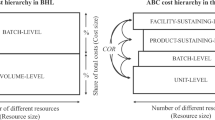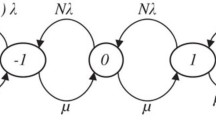Abstract
In the wake of servitization and increased aftersales competition, original equipment manufacturers (OEMs) begin to change their pricing strategies from traditional cost-based to value-based pricing. As value-based pricing is much more individualized and data-driven, it becomes increasingly important to validate one’s pricing hypotheses by estimating the causal effects of pricing interventions. Randomized controlled trials (RCTs) are conceptually the best method for making such causal inferences. However, RCTs are complicated, expensive, and often not feasible. MAN Energy Solutions was facing a similar challenge. In reaction to his, we conducted an action design research study (ADR) in which we designed and implemented a novel causal inference system for value-based spare parts pricing. Based on this, we formalize design principles for the broader class of such systems that emphasize the need for pre-aggregation when dealing with lumpy aftersales data, scalability when having to run numerous analyses on heterogenous spare parts portfolios, and incorporating unaffectedness conditions that help to avoid spillover effects caused by often interdependent spare parts purchases. Also, they encourage analysts to take pre-intervention predictability into account when interpreting causal effects, to incorporate a manipulated treatment variable into the causal inference model, and to present the system output in interactive user interfaces to aid understanding and acceptance.
Access this chapter
Tax calculation will be finalised at checkout
Purchases are for personal use only
Similar content being viewed by others
References
Sundin, E.: Life-cycle perspectives of product/service-systems: in design theory. In: Sakao, T., Lindahl, M. (eds.) Introduction to Product/Service-System Design. Springer, London (2009). https://doi.org/10.1007/978-1-84882-909-1_2
Cohen, M.A., Agrawal, N., Agrawal, V.: Winning in the aftermarket. Harv. Bus. Rev. 84, 129–138 (2006)
Thiess, T., Müller, O., Tonelli, L.: Design principles for explainable sales win-propensity prediction systems. In: WI2020 Zentrale Tracks, pp. 326–340 (2020)
Huang, M.H., Rust, R.T.: Artificial intelligence in service. J. Serv. Res. 21, 155–172 (2018)
Rust, R.T., Huang, M.H.: The service revolution and the transformation of marketing science. Mark. Sci. 33, 206–221 (2014)
Thiess, T., Müller, O.: Towards design principles for data-driven decision making - an action design research project in the maritime industry. In: 26th European Conference on Information System Beyond Digitization –Facets of Socio-Technical Change. ECIS 2018 (2018)
Gallagher, T., Mitchke, M.D., Rogers, M.C.: Profiting from spare parts. McKinsey Q. 2, 1–4 (2005)
Hinterhuber, A.: Towards value-based pricing—an integrative framework for decision making. Ind. Mark. Manag. 33, 765–778 (2004)
Hinterhuber, A.: Value delivery and value-based pricing in industrial markets. Adv. Bus. Mark. Purch. 14, 381–448 (2008)
Hinterhuber, A., Liozu, S.M.: Is innovation in pricing your next source of competitive advantage? Bus. Horiz. 57, 413–423 (2014)
Wickboldt, C., Kliewer, N.: Value based pricing meets data science: a concept for automated spare part valuation (2018)
Cullbrand, M., Levén, L.: Spare parts pricing-setting the right prices for sustainable profit at Atlet (2012)
Andersson, J., Bengtsson, J.: Spare parts pricing-Pre-study for a pricing strategy at Pon (2013)
Goodacre, S.: Uncontrolled before-after studies: discouraged by cochrane and the EMJ. Emerg. Med. J. 32, 507–508 (2015)
Hernán, M.A., Hernández-Diaz, S., Werler, M.M., Mitchell, A.A.: Causal knowledge as a prerequisite for confounding evaluation: an application to birth defects epidemiology. Am. J. Epidemiol. 155, 176–184 (2002)
Cochrane, A.L., et al.: Effectiveness and efficiency: random reflections on health services. Nuffield Provincial Hospitals Trust London (1972)
Cartwright, N.: Are RCTs the gold standard? Biosocieties 2, 11–20 (2007)
Varian, H.R.: Causal inference in economics and marketing. Proc. Natl. Acad. Sci. U.S.A. 113, 7310–7315 (2016)
Mora Cortez, R., Johnston, W.J.: The future of B2B marketing theory: a historical and prospective analysis. Ind. Mark. Manag. 66, 90–102 (2017)
Martínez-López, F.J., Casillas, J.: Artificial intelligence-based systems applied in industrial marketing: An historical overview, current and future insights. Ind. Mark. Manag. 42, 489–495 (2013)
Sein, M.K., Henfridsson, O., Purao, S., Rossi, M., Lindgren, R.: Action design research. MIS Q. 35, 37–56 (2011)
Gregor, S., Hevner, A.R.: Positioning and presenting design science research for maximum impact. MIS Q. 37, 337–355 (2013)
Benbasat, I., Zmud, R.W.: The identity crisis within the IS discipline: defining and communicating the discipline’s core properties. MIS Q. Manag. Inf. Syst. 27, 183–194 (2003)
Schulz, K.F., Chalmers, I., Hayes, R.J., Altman, D.G.: Empirical evidence of bias: dimensions of methodological quality associated with estimates of treatment effects in controlled trials. JAMA J. Am. Med. Assoc. 273, 408–412 (1995)
Rubin, D.B.: Estimating causal effects of treatments in randomized and nonrandomized studies. J. Educ. Psychol. 66, 688–701 (1974)
Cook, T.D., Campbell, D.T., Day, A.: Quasi-Experimentation: Design & Analysis Issues for Field Settings. Houghton Mifflin, Boston (1979)
Ashenfelter, O., Card, D.: Using the longitudinal structure of earnings to estimate the effect of training programs (1985)
Card, D.: The impact of the Mariel boatlift on the Miami labor market. Ind. Labor Relat. Rev. 43, 245 (1990)
Abadie, A.: Semiparametric difference-in-differences estimators. Rev. Econ. Stud. 72, 1–19 (2005)
Brodersen, K.H., Gallusser, F., Koehler, J., Remy, N., Scott, S.L.: Inferring causal impact using Bayesian structural time-series models. Ann. Appl. Stat. 9, 247–274 (2015)
Bertrand, M., Duflo, E., Mullainathan, S.: How much should we trust differences-in-differences estimates? Q. J. Econ. 119, 249–275 (2004)
Abadie, A., Gardeazabal, J.: The economic costs of conflict: a case study of the Basque Country. Am. Econ. Rev. 93, 113–132 (2003)
Abadie, A., Diamond, A., Hainmueller, J.: Synthetic control methods for comparative case studies: estimating the effect of California’s tobacco control program. J. Am. Stat. Assoc. 105, 493–505 (2010)
Varian, H.R.: Big data: new tricks for econometrics. J. Econ. Perspect. 28, 3–28 (2014)
Hevner, A.R., March, S.T., Park, J., Ram, S.: Design science in information systems research. MIS Q. 28, 75–105 (2004)
Baskerville, R.L., Myers, M.D.: Design ethnography in information systems. Inf. Syst. J. 25, 23–46 (2015)
Croston, J.D.: Forecasting and stock control for intermittent demands. Oper. Res. Q. 23, 289–303 (1972). https://doi.org/10.1057/jors.1972.50
Harvey, A.C., Amemiya, T.: Advanced Econometrics. Harvard University Press, Cambridge (1987)
Scott, S.L., Varian, H.R.: Predicting the present with Bayesian structural time series. Int. J. Math. Model. Num. Optim. 5, 4–23 (2014)
Bartezzaghi, E., Verganti, R., Zotteri, G.: Simulation framework for forecasting uncertain lumpy demand. Int. J. Prod. Econ. 59, 499–510 (1999)
Hyndman, R.J., Athanasopoulos, G.: Forecasting: Principles and Practice. OTexts, Australia (2018)
Scott, S.L., Varian, H.: Bayesian variable selection for nowcasting economic time series (2013)
Bartezzaghi, E., Kalchschmidt, M.: The Impact of aggregation level on lumpy demand management. In: Altay, N., Litteral, L. (eds.) Service Parts Management. Springer, London (2011). https://doi.org/10.1007/978-0-85729-039-7_4
Zotteri, G., Kalchschmidt, M.: A model for selecting the appropriate level of aggregation in forecasting processes. Int. J. Prod. Econ. 108, 74–83 (2007)
Bellman, R.E.: Adaptive Control Processes: A Guided Tour. Princeton University Press, Princeton (2015)
Gregor, S., Benbasat, I.: Explanations from intelligent systems: theoretical foundations and implications for practice. MIS Q. Manag. Inf. Syst. 23, 497–530 (1999)
Martens, D., Provost, F.: Explaining data-driven document classifications. MIS Q. Manag. Inf. Syst. 38, 73–99 (2014)
Pearl, J.: Causal diagrams for empirical research. Biometrika 82, 669 (1995)
Tashman, L.J.: Out-of-sample tests of forecasting accuracy: an analysis and review. Int. J. Forecast. 16, 437–450 (2000)
Fildes, R., Makridakis, S.: The impact of empirical accuracy studies on time series analysis and forecasting. Int. Stat. Rev. Int. Stat. 63, 289–308 (1995)
Makridakis, S., et al.: The accuracy of extrapolation (time series) methods: results of a forecasting competition. J. Forecast. 1, 111–153 (1982)
Bergmeir, C., Hyndman, R.J., Koo, B.: A note on the validity of cross-validation for evaluating autoregressive time series prediction. Comput. Stat. Data Anal. 120, 70–83 (2018)
Rubin, D.B.: Causal inference using potential outcomes: design, modeling, decisions. J. Am. Stat. Assoc. 100, 322–331 (2005)
Pearl, J.: Probabilities of causation: three counterfactual interpretations and their identification. Synthese 121, 93–149 (1999). https://doi.org/10.1023/A:1005233831499
Morgan, S.L., Winship, C.: Counterfactuals and Causal Inference. Cambridge University Press, Cambridge (2015)
Liu, S., Cui, W., Wu, Y., Liu, M.: A survey on information visualization: recent advances and challenges. Vis. Comput. 30(12), 1373–1393 (2014). https://doi.org/10.1007/s00371-013-0892-3
Kayande, U., De Bruyn, A., Lilien, G.L., Rangaswamy, A., van Bruggen, G.H.: How incorporating feedback mechanisms in a DSS affects DSS evaluations. Inf. Syst. Res. 20, 527–546 (2009)
Gregor, S., Jones, D.: The anatomy of a design theory. J. Assoc. Inf. Syst. 8, 312–335 (2007)
Author information
Authors and Affiliations
Corresponding author
Editor information
Editors and Affiliations
Rights and permissions
Copyright information
© 2020 Springer Nature Switzerland AG
About this paper
Cite this paper
Thiess, T., Müller, O. (2020). Designing Causal Inference Systems for Value-Based Spare Parts Pricing. In: Buchmann, R.A., Polini, A., Johansson, B., Karagiannis, D. (eds) Perspectives in Business Informatics Research. BIR 2020. Lecture Notes in Business Information Processing, vol 398. Springer, Cham. https://doi.org/10.1007/978-3-030-61140-8_13
Download citation
DOI: https://doi.org/10.1007/978-3-030-61140-8_13
Published:
Publisher Name: Springer, Cham
Print ISBN: 978-3-030-61139-2
Online ISBN: 978-3-030-61140-8
eBook Packages: Computer ScienceComputer Science (R0)




